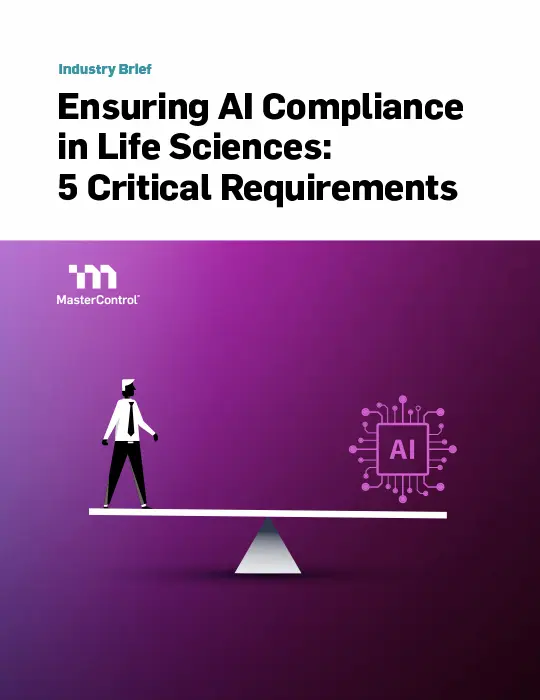
GxP Lifeline
Safeguarding Intellectual Property in Life Sciences Manufacturing in the Age of Generative AI

In highly regulated life sciences industries, like biotech, medical device, and pharmaceutical manufacturing, protecting your intellectual property (IP) isn't just good practice — it's mission-critical. But as generative artificial intelligence (AI) tools for life sciences like ChatGPT and Claude race ahead, a new risk is quietly growing: generative IP leakage.
Recent headlines say it all: Samsung engineers accidentally uploaded sensitive code to a public chatbot1; global banks and tech giants are banning staff from using external AI for company data2. For life sciences companies, the stakes are even higher — a single slip can compromise trade secrets, invite regulatory penalties, and jeopardize patient safety.
Regulations Haven't Changed — but the Tech Has
Life sciences manufacturers operate under some of the strictest quality and data integrity standards in the world: 21 CFR Part 11, EU Annex 11, GAMP® 5, etc. These frameworks demand airtight control over every digital record, signature, and system interaction. Yet generative AI by default is designed to learn from what you feed it. That means confidential R&D data, proprietary batch parameters, or validated standard operating procedures (SOPs) might not stay within your walls if pushed to an external model. Many enterprise APIs offer privacy promises — but in regulated environments, partial guarantees rarely satisfy auditors or regulators.
Why "Build" Might Be Safer Than "Buy"
Plug-and-play AI can offer speed and convenience. But building your own generative AI capabilities — and running them on infrastructure you fully control — may be the only reliable way to:
- Keep Sensitive IP In-House. On-prem or virtual private cloud deployments ensure no data leaks to a third party.
- Customize Validation and Audit Trails. Align AI pipelines directly with your SOPs, version controls, and electronic signature requirements.
- Fine-Tune Models to Your Processes. Tailor AI to your specific production lines or quality control (QC) checks for higher accuracy and more relevant insights.
- Future-Proof Compliance. With regulators still shaping AI policy, owning the entire stack gives you flexibility to adapt as standards evolve.
Lessons From Industry Leaders
Forward-thinking manufacturers aren't waiting for a breach. Roche, for example, emphasizes controlling patient data pipelines end-to-end for AI analytics3. Amgen runs AI-driven process optimization on internal microservices, insulating data from third-party exposure4. Like other industry leaders, MasterControl is taking a similarly proactive approach to responsible development of generative AI.
How to Build Responsibly
At MasterControl, we recommend companies take these steps to build secure generative AI for regulatory compliance:
- Form Cross-Functional Teams: Bring together quality assurance (QA), regulatory, manufacturing leads, AI engineers, and compliance officers to bridge knowledge gaps.
- Use Retrieval-Augmented Generation (RAG) With a Knowledge Graph: Ensure AI output remains relevant to regulatory context.
- Apply Parameter-Efficient Fine-Tuning: Techniques like LoRA (Low-Rank Adaptation) and QLoRA (Quantized Low-Rank Adaptation) let you adapt large models without massive compute costs.
- Integrate Machine Learning Operations (MLOps) and Validation Pipelines: Version every change and automate checks to maintain an auditable trail.
- Mirror GAMP® 5 in Your Continuous Integration and Continuous Delivery (CI/CD): Embed validation into your development and deployment workflows.
- Deploy With Zero-Trust Architecture: Enforce strict role-based access and keep all model interactions logged and monitored.
- Plan for Continuous Compliance: Monitor evolving regulations, revalidate models regularly, and manage adaptive learning under change control.
Final Thoughts
Generative AI is transforming how we work — but for life sciences manufacturers, the risk of exposing critical IP or failing an audit is very real. Building and controlling your own AI capabilities may not feel as quick as buying off the shelf, but in the long run, it's the surest path to protect your innovations, stay compliant, and maintain the trust of regulators and patients alike.
At MasterControl, we're committed to helping our industry innovate responsibly — without compromising the data that makes life-saving therapies possible.
Questions or ideas? Reach out to our AI Research team:
[email protected] | [email protected]
References:
- "Samsung Bans ChatGPT Among Employees After Sensitive Code Leak," Siladitya Ray, Forbes, May 2, 2023.
- "One in four companies ban GenAI," Alexei Alexis, CFO Dive, Jan. 30, 2024.
- "Roche innovations in the use of health data," Roche website, June 17, 2024.
- "From the Office to the Lab, Amgen Uses AI Tools to Unlock Innovation," Amgen website, May 22, 2024.
Free Resource

Enjoying this blog? Learn More.
Ensuring AI Compliance in Life Sciences: 5 Critical Requirements
Download Now
